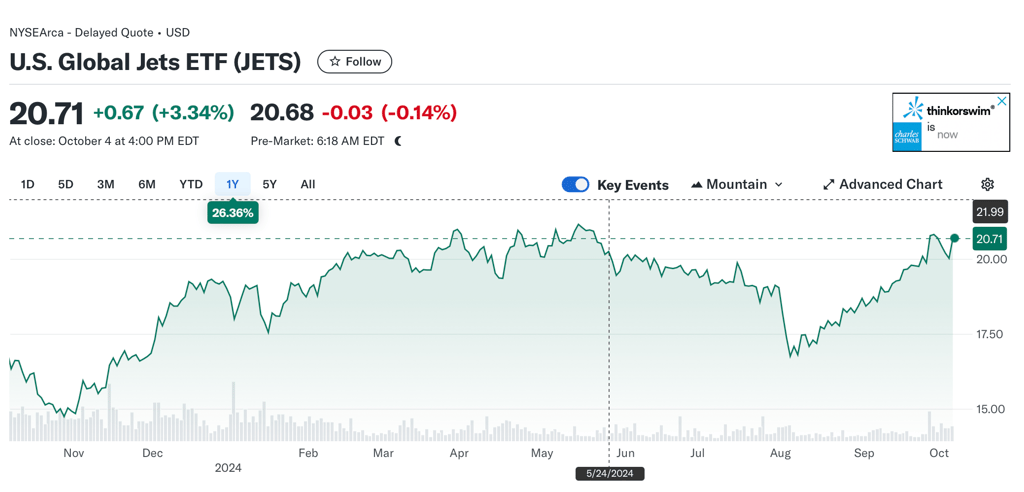
Click Here to Earn $5-200 In Free Stock!
Understanding JETS ETF: A Closer Look at Airline Investments
Daniel Williams
10/7/20244 min read


What is JETS ETF?
The JETS ETF, officially known as the U.S. Global Jets ETF, is an exchange-traded fund designed to provide investors with a means of gaining exposure to the airline industry. Launched in April 2015, the fund primarily invests in a diversified portfolio of airline-related stocks. This includes major carriers, regional airlines, and companies that provide services essential to the aviation sector, such as aircraft manufacturers and airport operators. By aggregating various airline stocks into a single investment vehicle, the JETS ETF offers a simplified way for both retail and institutional investors to participate in the dynamics of the airline market.
The operational structure of the JETS ETF allows investors to buy shares of the fund, which correspond to a collection of underlying stocks. This setup is particularly beneficial for those who wish to avoid the complexity and risk associated with investing in individual airline stocks. Instead of selecting and managing multiple airline investments, an investor can gain exposure to the sector's performance with a single transaction. This diversification mitigates risks associated with specific airlines while ensuring participation in the collective performance of the industry, making it an attractive option for many.
Moreover, the JETS ETF aligns with the increasing trend of passive investment strategies that focus on specific sectors. Its objective is to track an index that encompasses the performance of leading airlines and aerial service providers, thereby reflecting global aviation trends. The benefits of investing in the JETS ETF include reduced volatility compared to single stock investments, ease of access through major stock exchanges, and the potential for capital appreciation as air travel demand continues to grow. In summary, the JETS ETF stands out as a significant vehicle for those interested in capitalizing on the developments in the airline industry without the challenges of direct stock selection.
The Importance of Airline Stocks in the Stock Market
Airline stocks hold a significant place within the broader stock market due to their considerable impact on the global economy and investor sentiment. The performance of airlines often serves as a barometer for economic activity; when people travel more, it indicates confidence in the economy’s growth. Therefore, fluctuations in airline stock prices can provide insights into consumer behavior and overall economic health.
Several factors influence airline stock prices, with fuel costs being one of the most prominent. Fuel expenses constitute a substantial portion of an airline's operating costs, and variances in oil prices can dramatically affect profitability. In periods of rising fuel costs, airlines may face pressure on margins, potentially leading to diminished stock performance. Conversely, lower fuel prices generally enhance profitability margins, often boosting airline stock valuations.
Travel demand is another critical component that affects airline stocks. Economic cycles drive travel demand; during periods of economic expansion, both leisure and business travel tend to increase. However, downturns can severely impact ticket sales, resulting in revenue declines. Regulatory factors also play a role, as governmental policies regarding air travel, security measures, and infrastructure can influence operational capabilities and, subsequently, stock performance.
Historically, airline stocks have shown both substantial risks and rewards. Their tendency for volatility can deter some investors, but for risk-tolerant individuals, they can provide significant returns, especially during periods of economic recovery or growth. An exchange-traded fund (ETF) like JETS can offer diversification, mitigating the risks associated with investing in individual airline stocks. While investing in airline stocks carries inherent risks, understanding market dynamics can lead to informed investment decisions in this sector.
DwillsPrimetime's Investment in JETS ETF
DwillsPrimetime has strategically positioned itself within JETS ETF, recognizing the unique opportunities that the airline sector presents amid evolving market conditions. JETS ETF, or the U.S. Global Jets ETF, provides exposure to a diverse array of airline stocks, including both major legacy carriers and regional airlines. By investing in this exchange-traded fund, DwillsPrimetime aims to capitalize on the anticipated recovery and growth trajectories in the airline industry post-pandemic.
One of the key benefits of JETS ETF is its inherent diversification. By holding shares in this fund, DwillsPrimetime minimizes the risks associated with investing in a single airline. The diversified nature of the ETF allows for better risk management and positions DwillsPrimetime to benefit from favorable trends across various segments of the airline market. Furthermore, the fund's exposure to other aviation-related companies, such as airports and manufacturers, adds additional layers of stability and growth potential.
DwillsPrimetime's investment strategy is underpinned by thorough market research and an in-depth analysis of the airline industry's dynamics. The firm recognizes that while short-term volatility may affect airline stocks, long-term growth is supported by a resurgence in travel demand, expanding global markets, and the gradual return of business travel. The firm believes that as international travel restrictions ease, the sector is poised for recovery, leading to increased profitability for airline companies.
In aligning with the overall performance of the JETS ETF, DwillsPrimetime anticipates that the fund's returns will mirror the resurgence of the airline industry. The firm's future outlook remains optimistic as it continues to monitor trends that indicate a robust recovery in air travel, positioning themselves to leverage potential gains in the coming years. This commitment to maintaining a presence in the airline sector through the JETS ETF exemplifies DwillsPrimetime's proactive investment philosophy and forward-thinking approach.
Future Trends and Analysis for JETS ETF
The JETS ETF, which focuses on airline investments, stands at the intersection of substantial opportunities and notable challenges as the airline industry evolves. As we look towards the future, several trends are emerging that could significantly impact JETS ETF's performance. One of the primary factors is the technological advancements within the airline sector. Innovations in aircraft design, fuel efficiency, and automated systems are expected to shape operational capabilities and lower overhead costs. Moreover, the integration of sustainable aviation fuels (SAF) is imperative for enhancing environmental performance, which can appeal to a more environmentally conscious investor base.
Another critical factor influencing the JETS ETF is the ongoing recovery from the COVID-19 pandemic. Although travel demand has rebounded, the passenger behavior has shifted, emphasizing the need for flexibility and enhanced safety protocols. Airlines that adapt swiftly to these new consumer preferences will likely gain a competitive edge. Investors should monitor how various airlines within the ETF manage their capacity to meet changing travel patterns. Furthermore, government policies and economic stimuli aimed at bolstering the aviation industry will play a significant role in shaping its future landscape.
Despite the myriad opportunities, the airline industry also faces considerable challenges including rising fuel prices and potential geopolitical conflicts that can disrupt operations. The global economic outlook will influence discretionary spending on travel, making the market sentiment a vital factor to consider. Analysts are cautiously optimistic, with forecasts suggesting moderate growth in airline travel post-pandemic; however, any disruptions may lead to volatility in the JETS ETF. Overall, investors should keep an eye on technological progress, regulatory developments, and market trends to make informed decisions regarding the JETS ETF in the evolving aviation landscape.
